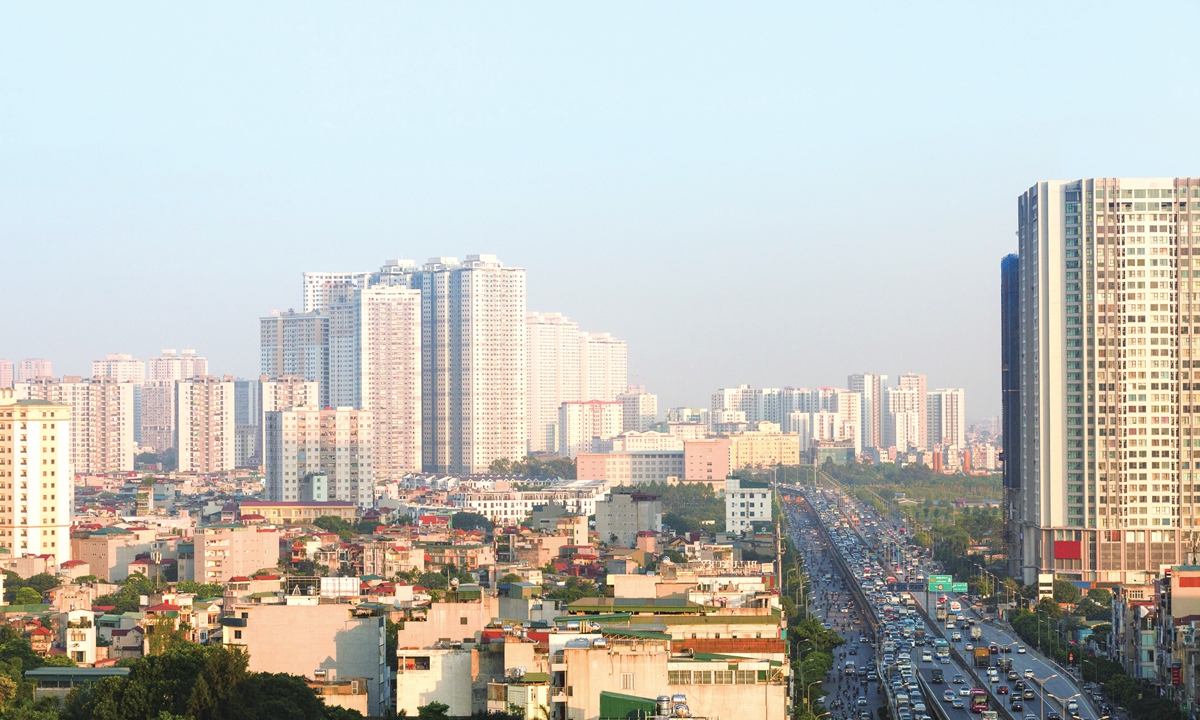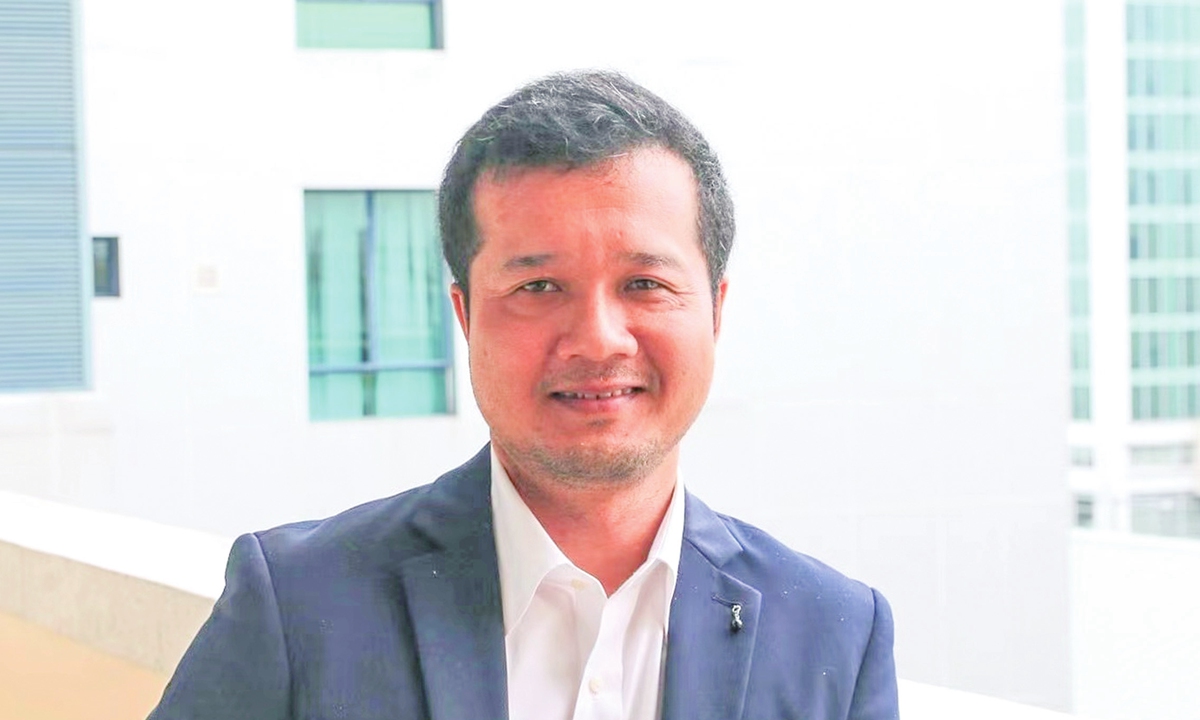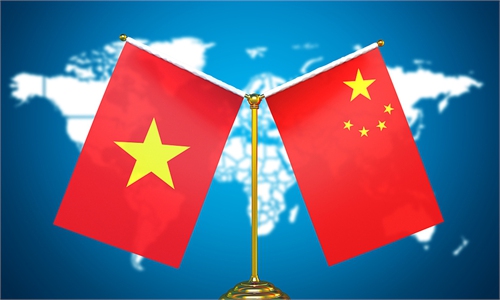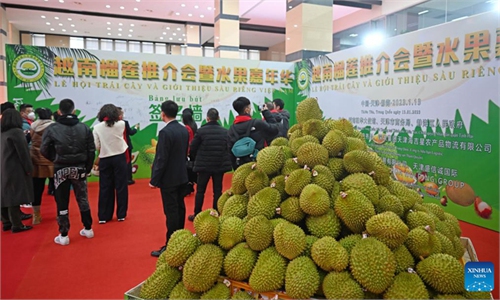Vietnam won't allow other countries to exploit it for anti-China purpose: Vietnamese scholar

A view of Hanoi, capital city of Vietnam Photo: VCG
Editor's Note:
Xi Jinping, general secretary of the Communist Party of China Central Committee and Chinese president, is on a state visit to Vietnam from Tuesday to Wednesday at the invitation of the Vietnamese side. Six years after his last Vietnam trip, what significance does Xi's visit to Vietnam hold this time? Against the backdrop of the China-US competition, how should Vietnam position itself as well as its relationship with the two major powers? Nguyen Tang Nghi (Nghi), vice dean of the Faculty of International Relations at Vietnam National University of Ho Chi Minh City, shared his views with Global Times (GT) reporter Li Aixin.
GT: President Xi is currently visiting Vietnam, where both sides will explore a "new positioning" and "new level" of China-Vietnam relations. What are your expectations for this new positioning? In your view, what significance does an elevation of bilateral relations hold?
Nghi: In today's world, numerous issues require reflection and concern, ranging from the Russia-Ukraine conflict, the war in the Gaza Strip, the global economic recession, to the strategic competition between China and the US. These issues inevitably impact the thoughts, attitudes and diplomatic policies of every nation. China-Vietnam relations will also face challenges stemming from these global concerns. Therefore, President Xi's visit, apart from consolidating and strengthening the comprehensive and multifaceted relationship between the two countries, requires timely policy adjustments from both leaders to align with global and regional trends.
Xi's state visit underscores the high importance both Vietnam and China attach to their special relationship. The visit is expected to deepen cooperation and development in various areas, including politics, security, as well as infrastructure and trade. Subsequently, it is expected to affirm and solidify the strong trust between the two parties, the two countries and the two peoples. I look forward to more concrete and in-depth cooperation in areas such as infrastructure and transportation arising from this visit, laying a solid foundation for the future development and elevation of bilateral relations.
GT: In recent years, leaders of both countries have often emphasized that China and Vietnam share a traditional friendship featuring "camaraderie plus brotherhood." How do you interpret and feel about this expression in the context of China-Vietnam relations?
Nghi: The comradeship in the concept of "camaraderie plus brotherhood" embodies the "party ties" of the bilateral relationship. Both Vietnam and China are socialist countries with similar ideologies, acknowledging the leadership role of the communist party. The addition of the term "brothers" in the current context signifies a mutual determination to draw each other closer amid a world marked by divisions and excessive polarizations. This expression also suggests that there is a need from both sides for more goodwill and sincerity in cooperation and the resolution of differences. As brothers, we should address and resolve our frictions candidly. Additionally, both countries need to treat each other candidly in the fields of cooperation and development, supporting each other and jointly addressing new issues in the region and the world.
GT: In the field of China-Vietnam economic and trade cooperation, what do you think is the next area of focus and which area has the most potential?
Nghi: There is significant room for the development of China-Vietnam relations. China is a powerhouse in technology, digital transformation and artificial intelligence. Furthermore, China is regarded as a leading country in terms of providing support and investment for the development of industries and infrastructure on a global scale. Therefore, in the foreseeable future, these will be potential areas in which both China and Vietnam can mutually drive and collaborate. China possesses experience, capabilities and influence in these areas, while Vietnam genuinely needs China's support to facilitate its economic and social development.
In addition to this, if China can effectively support and promote Vietnam's development, there is a strong possibility China will further penetrate the ASEAN market, given Vietnam's increasing role among Southeast Asian nations.

Nguyen Tang Nghi Photo: Courtesy of Nghi
GT: Some observers worry that against the backdrop of the competition with China, the US is using Vietnam as a pawn in its Indo-Pacific Strategy. Do you share these concerns? How do you think Vietnam should avoid being exploited by the US?
Nghi: Vietnam's 2019 National Defense White Paper clearly articulates the spirit of the "Four Nos" policy: no partaking in military alliances, no siding with one country to act against another, no foreign military bases in the Vietnamese territory or using Vietnam as leverage to counteract other countries, and no using force or threatening to use force in international relations.
Vietnam prioritizes its national interests. I believe the claims that Vietnam is aligning with the US to confront China are unfounded and lack credibility. Vietnam will not ally with the US to confront any country, including China. Furthermore, the well-established multifaceted relationship between Vietnam and China has been nurtured and developed by leaders from both countries over multiple generations. Vietnam has no reason to form alliances with third parties to counter China, nor does it have a reason to allow other countries to exploit Vietnam for anti-China purposes. The prosperity and stability of Vietnam-China relations hold special significance for the two parties and their peoples.
GT: During Chinese Foreign Minister Wang Yi's recent visit to Vietnam, both sides expressed their commitments to jointly making the South China Sea a sea of peace and cooperation. How do you evaluate the efforts of both sides in this regard? What is the significance of maintaining stability in the South China Sea?
Nghi: As I mentioned earlier, the term "camaraderie plus brotherhood" holds significant meaning in addressing the cognitive differences between the two sides over the South China Sea issue. As two brotherly nations, Vietnam and China need to approach the resolution of the South China Sea issue with more sincerity and candor. Both sides must respect the United Nations Convention on the Law of the Sea adopted in 1982 while simultaneously establishing peace, friendship and cooperation in the South China Sea. This issue affects the security and development of both countries, the region and the world. Both nations need to have greater sincerity and willingness to work together to address prominent issues, contributing to maintaining peace and creating an environment for the economic, social and security development of all parties.
GT: You used to study at Renmin University of China (RUC). During your time in China, what left the deepest impression on you?
Nghi: The spirit of the Chinese people left a deep and positive impression on me. I spent four years pursuing my PhD at RUC. During that time, I received careful guidance and care from my professor and colleagues. I appreciate and cherish the years of study and research at RUC. I have always believed that China was a place that helped me grow in studying, research and future development.
Moreover, during my time in China, I visited many places and made numerous Chinese friends and acquaintances. The time I spent in China allowed me to experience the warmth and hospitality of the Chinese friends I met, as well as their willingness to help and support me. I always found the Chinese people to be genuinely united and kind. They exhibit a proactive attitude in all aspects of work. I believe that, in addition to correct policies, the unity and spirit of the Chinese nation have contributed significantly to shaping and building today's China.
GT: In August, you visited China for academic exchanges. Can you introduce this exchange with the Chinese scholars?
Nghi: In August, I led 168 undergraduate students and six professors from the College of Social Sciences and Humanities at Vietnam National University of Ho Chi Minh City to visit Fudan University and Shanghai International Studies University for academic exchanges. This trip provided Vietnamese students with an opportunity to study and experience China's development achievements. This will contribute to enhancing mutual understanding between the two nations' youth. Moreover, visiting prestigious Chinese universities like Fudan University motivates our undergraduate students to have more enthusiasm for study and research. In particular, the seminars and lectures at these Chinese universities have allowed our students to gain a better understanding and experience of China's diplomatic policies and strategies in the new era.



